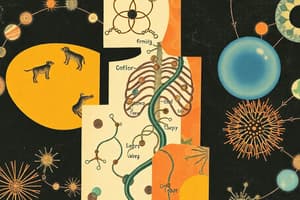Podcast
Questions and Answers
Which of the following forms of cell signalling involves hormone release that affects the same cell that produced it?
Which of the following forms of cell signalling involves hormone release that affects the same cell that produced it?
- Exocrine signalling
- Autocrine signalling (correct)
- Paracrine signalling
- Endocrine signalling
Which class of hormones includes growth hormone and insulin?
Which class of hormones includes growth hormone and insulin?
- Class 2: Large protein hormones (correct)
- Class 3: Cholesteroid derivatives
- Class 4: Vitamins
- Class 1: Amino acid derivatives
What is the primary effect of hypothalamic releasing factors on the anterior pituitary hormones?
What is the primary effect of hypothalamic releasing factors on the anterior pituitary hormones?
- They enhance the release of specific anterior pituitary hormones. (correct)
- They have no effect on anterior pituitary hormones.
- They inhibit the release of all anterior pituitary hormones.
- They slow down the production of hypothalamic hormones.
Which hypothalamic inhibitory hormone is responsible for inhibiting prolactin secretion?
Which hypothalamic inhibitory hormone is responsible for inhibiting prolactin secretion?
Which hormone's surge coincides with elevated estrogen levels, leading to increased LH levels during the menstrual cycle?
Which hormone's surge coincides with elevated estrogen levels, leading to increased LH levels during the menstrual cycle?
Flashcards are hidden until you start studying
Study Notes
Forms of Cell Signalling
- Autocrine signalling involves a cell responding to substances that it releases itself, affecting its own activity.
- Paracrine signalling occurs when cells communicate with nearby cells through the release of signaling molecules, allowing localized effects.
- Endocrine signalling involves hormones being released into the bloodstream, affecting distant target cells and organs.
Classification of Hormones
- Class 1: Amino Acid Derivatives
- Includes hormones derived from single amino acids, such as:
- Thyroxine
- Epinephrine
- Norepinephrine
- Dopamine
- Includes hormones derived from single amino acids, such as:
- Class 2: Large Protein Hormones
- Composed of chains of amino acids:
- Insulin consists of 51 amino acids.
- Parathyroid hormone consists of 84 amino acids.
- Composed of chains of amino acids:
- Class 3: Cholesterol Derivatives
- Steroid hormones derived from cholesterol, including:
- Aldosterone
- Cortisol
- Testosterone
- Estrogen
- Progesterone
- Steroid hormones derived from cholesterol, including:
- Class 4: Vitamins
- Some hormones are derived from vitamins, for example:
- Vitamin A derivatives.
- Some hormones are derived from vitamins, for example:
Hypothalamic and Pituitary Hormones
- Most anterior pituitary hormones are regulated by negative feedback mechanisms, except for LH, which sees a surge during the peak of estrogen levels.
- Hypothalamic Releasing Factors
- Key hormones released from the hypothalamus include:
- Thyrotropin-releasing hormone (TRH)
- Corticotropin-releasing hormone (CRH)
- Gonadotropin-releasing hormone (GnRH)
- Growth hormone-releasing hormone (GHRH)
- Key hormones released from the hypothalamus include:
- Anterior Pituitary Hormones
- The anterior pituitary releases several hormones in response to hypothalamic signals, such as:
- Thyroid-stimulating hormone (TSH)
- Adrenocorticotropic hormone (ACTH)
- Follicle-stimulating hormone (FSH)
- Luteinizing hormone (LH)
- Growth hormone (GH)
- The anterior pituitary releases several hormones in response to hypothalamic signals, such as:
Hypothalamic Inhibitory Hormones
- Prolactin releasing inhibiting hormone is known to be dopamine, which inhibits prolactin secretion.
- Growth hormone release is inhibited by somatostatin, regulating growth hormone levels.
Studying That Suits You
Use AI to generate personalized quizzes and flashcards to suit your learning preferences.




